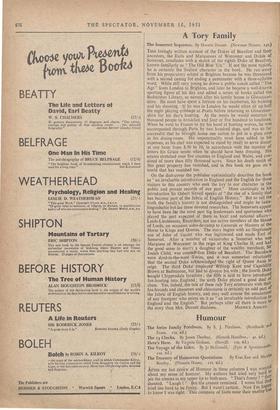A Tory Family
The Somerset Sequence. By Horatia Durant. (Newman Neame. us.) Tins lovingly written account of the Dukes of Beaufort and their ancestors, the Earls and Marquesses of Worcester and Dukes of Somerset, concludes with a sketch of the eighth Duke of Beaufort, known familiarly as "The Old Blue 'Un." If not the most typical, he is certainly the liveliest character in the •book. He ran away from his preparatory school at Brighton because he was threatened with a second caning for ending a pentameter with a three-syllable word. While still very young he drove a public coach called !` The Age' from London to Brighton, and later he became a well-known sporting figure of his day and edited a series of books called the Badminton Library, so named after his family house in Gloucester- shire. He must have spent a fortune on his racehorses, his hunting and his shooting. If he was in London he would often sit up half the night playing cribbage at Pratts before returning to Gloucester- shire for his day's hunting. At the meets he would entertain a thousand people to breakfast and four or five hundred to luncheon. When he went to France to try his hand at hunting wolves, he was accompanied through Paris by two hundred dogs, and was so far successful that he brought home one victim to put in a glass case in his dining-room. His unpunctuality must haw added to his expenses, as his chef was expected to stand by ready to serve dinner at any hour from 8.30 to 10, in accordance with the number of letters his Grace wrote when he should have been dressing.
estates stretched over five counties in England and Wales, and con- sisted of more than fifty thousand acres. Since his death much of this great property has vanished, and in this book we gaze on a world that has vanished too.
On the dust-cover the publisher optimistically describes the book as "an invaluable introduction to England and the English for those visitors to this country who seek the key to our character in the public and private records of our past." More cautiously in his introduction Sir Osbert Sitwell speaks of "the rise of a family that has become part of the fabric of English History." But to tell the truth the family's history is not distinguished and might be indis- tinguishable but for these devoted researches. The Somersets appear to have been for the most part big landowners and sportsmen who played the part expected of them in local and national affairs-- Lords-Lieutenants, Recorders, not too active members of the House of Lords, on occasion aides-de-camp to Generals or Masters of the Horse to Kings and Queens. The story begins with an illegitimate son of John of Gaunt who was legitimised and made Earl of Somerset. After a number of vicissitudes a Somerset who was Marquess of Worcester in the reign of King Charles II, and had the good sense to marry a daughter of the wealthy merchant; Sir Josiah Child, was create&first DUlte'of Beaufort. The Beaufort, were dyed-in-the-wool 'Tories, and it' was somewhat reluctantlY that the second Duke aCknowledged 'the right of Queen Anne to reign. The third Duke employed' Will hilt' Kent and CapabilitY Brown at Badminton, but had to divorce his wife ;, the fourth Duke bought Chippendale furniture ; the fifth is said to have introdueel fox-hunting into England ; the sixth Duke played a good deal o chess. Yes, indeed, the tale of these rich Tory aristocrats with their, fox-hounds and chessmen and chinoiserie is certainly an odd part 0' the fabric of English history, and may well arouse the amazement of any foreigner who seizes on it as an invaluable introduction to England and the English." But perhaps after all there is more to the story than Mrs. Durant discloses. MAURICE ASHLEY.














































































 Previous page
Previous page